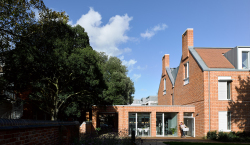CIBSE Building Performance Awards: Cranmer Road named Project of the Year!
27 February 2023

We are delighted to announce that Cranmer Road has been named Project of the Year (non-domestic) at the CIBSE Building Performance Awards 2023!
Judges praised the continuity of design, delivery and operation of King’s College, Cambridge’s new Passivhaus student blocks, and the focus on optimising building performance.
They highlighted the feedback from the surveys used to further improve energy performance; comprehensive commissioning; and detailed analysis of the impact of a range of future climate scenarios, with results of the analysis influencing design and construction.
It's the sixth time in seven years that Max Fordham has won Project of the Year at the CIBSE Building Performance awards, which are the only industry awards that focus on measured performance outcomes, and not just design intent or performance specifications.
"It was great to start the day showing people around Cranmer Road, seeing the buildings being lived in and enjoyed as intended, and amazing to finish it with a CIBSE award. It's a testament to the client, design, and delivery team for the project, from setting a forward-looking brief to delivering excellent airtightness, and everything in between. We hope it continues to encourage more people to build all-electric, Passivhaus buildings with timber-based structures." - Gwilym Still, Passivhaus Leader, Max Fordham
Cranmer Road is an exemplary student housing project that showcases many of the approaches to sustainable and low-energy design that are essential to achieving net zero carbon.
Working alongside Allies and Morrison Architects, we provided MEP, Passivhaus, and acoustic services for Cranmer Road which houses 59 graduate students in bedrooms across two modern buildings, designed to sit comfortably alongside the neighbouring arts and crafts villas.
The building achieves low operational carbon emissions by using only electricity, and relatively little of it. The low embodied carbon primary structure also helped it to achieve airtightness results three to four times better than the Passivhaus limit – more than 50 times better than building regulations require. The measured peak heating demand has been 20% lower than the Passivhaus limit.
A simple building user guide was written and shared with every student, so they could understand the background of the building, and how to interact with it to achieve comfort in a low-energy way.
Reviewing the operational energy consumption allowed a sense check to understand if the services and systems were operating as intended and target areas for improvement, with the analysis helping to demonstrate that the building generally aligned with the modelling.
Carrying out an occupant survey allowed both energy use and occupant feedback to be brought together to ensure that very low energy consumption wasn’t being achieved to the detriment of occupant satisfaction and comfort.

.jpg)